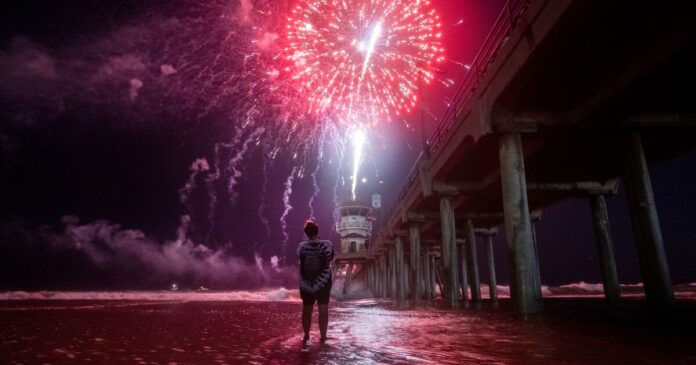Dozens of fireworks shows, and many smaller backyard or neighborhood pyrotechnic displays, lit up Southern California skies throughout the Fourth of July celebration Tuesday — leaving an almost instant negative effect on the region’s air quality.
Air quality monitors from Pasadena to Long Beach dropped into unhealthy levels right around 10 p.m. Tuesday after measuring in mostly healthy levels for most of the day, according to the U.S. Air Quality Index. In the hours after fireworks spectacles were launched, levels dropped into the hazardous range for some parts of the region, increasing the likelihood of adverse health effects.
Every year, the South Coast Air Quality Management District warns how the holiday’s colorful displays are expected to again bring some of the worst air quality days of the year, as fireworks emit high levels of particle pollution and metal air pollutants. Both of those byproducts are known to bring negative health effects, the agency said.
Though a few coastal fireworks shows were canceled this year after a dispute over new environmental regulations — and some communities switched to more environmentally-friendly drone or light shows — fireworks still had a significant effect on Southland skies.
As early as Wednesday — hours after most of the fireworks concluded — air quality in a few areas, including the eastern San Gabriel Valley and the San Bernardino area, reached hazardous, which the U.S. air quality index considers the most concerning level.
The air quality in Glendora and parts of the Inland Empire, including Riverside and Rancho Cucamonga, remained in the very unhealthy level on the Air Quality Index on Wednesday morning, according to the South Coast Air Quality Management District. Much of the Los Angeles area remained in the unhealthy level.
These levels indicate conditions in which everyone may experience some adverse health effects from the poor air quality, such as difficulty breathing or throat irritation, while sensitive groups, including pregnant people and those with asthma, may experience more serious issues, according to the U.S. Environmental Protection Agency.
The air quality district recommends people stay indoors, close windows and run air conditioning or air purifiers when air quality is poor.


